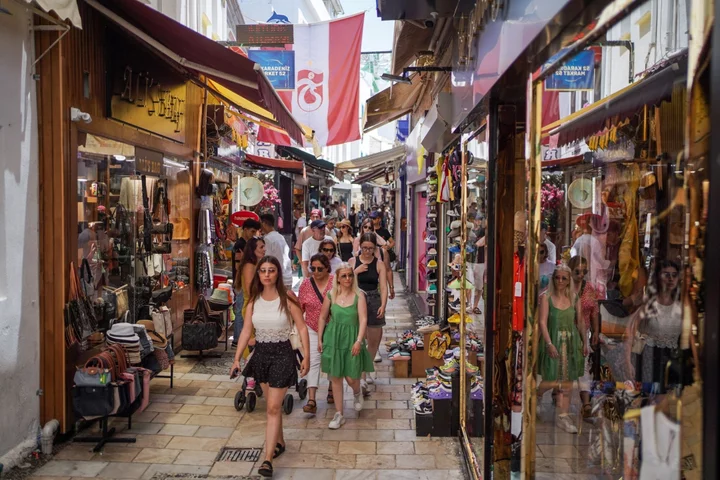Turkish inflation ended its eight-month deceleration in July, putting it on track for a surge that the central bank only expects to peak closer to the middle of next year.
Consumer prices jumped an annual 47.8%, from 38.2% in June, statistics office data showed Thursday. The median forecast in a Bloomberg survey of economists was 46.8%. Monthly inflation reached 9.5%.
Price pressures have been building since the lira began to depreciate sharply after May elections won by President Recep Tayyip Erdogan. Adding to risks for inflation, the government also raised taxes on a variety of essential goods and fuel, in part to help pay for costly pledges made in the run-up to the ballot.
The inflationary wave that’s washing over the $900 billion economy follows just months after its worst cost-of-living crisis in decades. The International Monetary Fund expects price growth in Turkey to be the world’s fifth-fastest in 2023.
What Bloomberg Economics Says...
“The government’s expansive price and tax adjustments are set to be key drivers of the inflation rate surge. We also expect to see a sizable contribution from the rapid depreciation in the lira following May’s elections.”
— Selva Bahar Baziki, economist. Click here to read more.
The central bank has already responded with two sharp interest-rate hikes that raised its benchmark by 900 basis points to 17.5%. Last week, policymakers more than doubled their year-end forecast for inflation to 58%, with Governor Hafize Gaye Erkan anticipating it will peak at about 60% in the second quarter of 2024.
The policy pivot so far still means official borrowing costs remain deeply negative when adjusted for prices. Deutsche Bank AG predicts the central bank will only bring its key rate to 19% this month.
Erkan has said further tightening of monetary conditions will remain “gradual” to manage its impact on the real sector and the banking industry, and that alternative measures would be introduced to support policy.
The monetary authority and the banking regulator have taken some steps to curb domestic demand through measures aimed at cooling credit-card spending and consumer loan growth.
--With assistance from Harumi Ichikura.

